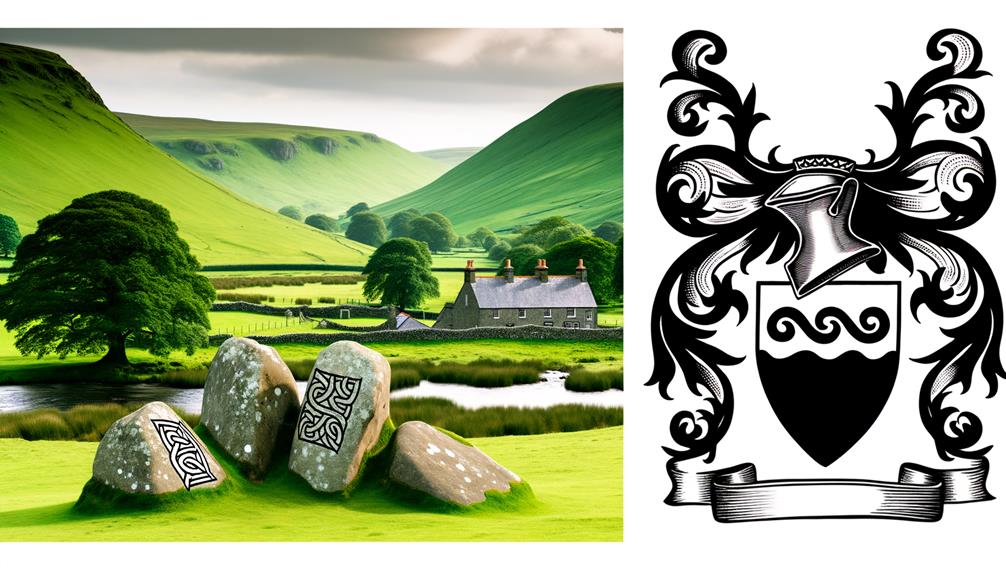Morgan Last Name Meaning and Origin
The surname Morgan originates from the Old Welsh name 'Morcant,' combining 'mor' (sea) and 'cant' (completion or circle). Its roots trace back to medieval Wales, where it signified a maritime heritage and leadership, often interpreted as 'sea chief' or 'sea-born.' Prominently documented in historical manuscripts such as the 'Annales Cambriae' and embraced by notable dynastic families, Morgan proliferated especially during and post the Norman Conquest.
This surname has been borne by influential figures across various fields and maintains a significant cultural presence in Wales and beyond. There's a rich tapestry of historical narratives tied to this name.

Key Takeaways
- The surname Morgan is derived from the Old Welsh name 'Morcant,' meaning 'sea circle' or 'completion.'
- Historically, Morgan signifies 'sea-born' or 'sea chief,' rooted in early medieval Welsh culture.
- It spread widely during the Norman Conquest and became prominent in Glamorgan by the 13th century.
- Morgan is associated with maritime traditions, symbolizing strength and leadership in Welsh heritage.
- The name has notable historical and cultural significance, linked to influential figures in various fields.
Etymology of Morgan
The etymology of the surname 'Morgan' is rooted in the Old Welsh name 'Morcant,' which is believed to be derived from the elements 'mor,' meaning 'sea,' and 'cant,' meaning 'circle' or 'completion.'
This etymological foundation suggests a connection to maritime traditions or a metaphorical representation of wholeness and cyclical nature. 'Morgan' evolved through linguistic transformations influenced by socio-cultural exchanges in medieval Wales.
Documented historical usage of 'Morcant' in ancient Welsh manuscripts underscores its longstanding presence and significance. The elements 'mor' and 'cant' are common in Old Welsh nomenclature, reflecting the linguistic heritage and environmental factors that shaped naming conventions.
Understanding the etymology of 'Morgan' provides a window into the cultural and linguistic landscape of early Welsh society.
Historical Roots
Rooted in the annals of Welsh history, the surname 'Morgan' can be traced back to early medieval times, where it was borne by notable chieftains and documented in various historical records.
The name appears in the 10th-century 'Annales Cambriae' and the 'Brut y Tywysogion,' texts chronicling the deeds of Welsh princes. Derived from the Old Welsh personal name Morcant, 'Morgan' signifies 'sea-born' or 'sea chief,' reflecting the maritime culture of early Welsh society.
The surname proliferated as families adopted hereditary names during the Norman Conquest in the 11th century. By the 13th century, the Morgans had established themselves as a prominent dynastic family in Glamorgan, playing a significant role in local governance and feudal affairs.
Notable Figures
Throughout history, numerous individuals bearing the surname 'Morgan' have risen to prominence, leaving indelible marks on fields ranging from politics and military to arts and sciences.
J.P. Morgan, an influential financier and banker, played a pivotal role in the development of the American economy during the late 19th and early 20th centuries.
In the domain of literature, Richard Morgan has garnered acclaim as a science fiction author, known for his 'Altered Carbon' series.
Military history remembers Daniel Morgan, a celebrated American Revolutionary War general whose tactics greatly contributed to American victories.
Additionally, in the sciences, Thomas Hunt Morgan, a Nobel laureate geneticist, made groundbreaking discoveries in chromosomal inheritance.
These figures exemplify the diverse contributions of individuals with the Morgan surname.
Geographic Distribution
Many individuals bearing the surname 'Morgan' can be found across various continents, with significant concentrations in countries such as the United States, the United Kingdom, and Australia, reflecting historical migration and settlement patterns.
The name Morgan has deep roots in Wales, from where it spread to England and beyond during the Middle Ages. The Industrial Revolution and subsequent global movements saw many Welsh and English Morgans emigrate to the Americas and Australia.
Importantly, the United States witnessed a substantial influx during the 19th and early 20th centuries, contributing to its widespread presence today. Additionally, census records and genealogical studies illustrate the surname's proliferation in regions shaped by British colonial influence, further underscoring its extensive geographic distribution.
Cultural Significance
The widespread geographic distribution of the Morgan surname is paralleled by its rich cultural significance, particularly within Welsh heritage where it symbolizes maritime strength and leadership. Historically, the name Morgan derives from the Old Welsh given name 'Morcant,' which translates to 'sea chief' or 'sea defender.'
This etymology reflects the seafaring prowess and leadership qualities historically attributed to individuals bearing the name. The Morgans have been historically noted as influential figures in Welsh society, contributing to both local governance and national defense.
In folklore, the name is often associated with the legendary King Arthur's half-sister, Morgan le Fay, further embedding it within the cultural and mythological tapestry of the region. The Morgan surname embodies a legacy of resilience and influence.
Conclusion
The name Morgan, much like an ancient river, traverses through time, carrying with it the sediment of Celtic origins, the echoes of historical figures, and the cultural imprints of various regions.
Flowing from the Welsh 'Morcant,' meaning 'sea circle,' this name has meandered through the landscapes of history, leaving traces in literature, politics, and geography.
As rivers carve valleys and shape destinies, so too does the name Morgan etch its enduring legacy across generations.






